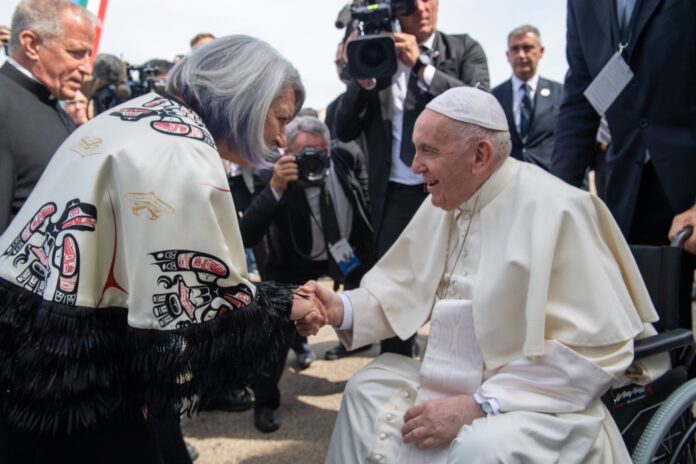Now that Pope Francis has arrived in Canada and is expected to beg forgiveness for Catholic-run residential schools, a team of translators is dedicated to making sure no words are lost for those receiving the apology.
According to CTV, Henry Pitawanakwat, who comes from the Three Fires Confederacy of Manitoulin Island, is part of the team translating the Pope’s words into the Ojibwa language.
From the late 1800s until 1996, Canada removed Indigenous children from their homes and forced them into institutions run by church staff where they were forbidden from speaking their language. Pitawanakwat’s mother was a residential school survivor, which he says also impacted him.
And he says he also suffered abuse and trauma from members of the Jesuits as a youth.
With experience as an archeologist at Wikwemikong Unceded Territory and a curator at the Canadian Museum of History in Gatineau, Quebec, Pitawanakwat is a member of the Translation Bureau with the Government of Canada and has translated the federal election debates in 2019 and 2021 and also recently for an APTN series.
Translating a religious event will have challenges, he says.
A lot of Bible words don’t have corresponding words in Ojibwa. But he says the general context is the same — prayers in both cultures are for the same reason: forgiveness and letting go.
Even though Pitawanakwat remains impartial for the translation process, he’s hoping to hear more than just an apology from Francis. He wants a commitment to supporting Indigenous language and culture.
Preserving Indigenous languages is important, he emphasizes, not just to remember the past but to save the future. The languages, he said, hold knowledge for solutions to current problems like climate change and pollution.
He adds he would like to see assistance to create immersion schools where First Nations can bring back their own language because it was directly from the residential school that many lost their language and culture.
“An apology for him, it’s over. For us, the trauma and the pain continues for life.”



